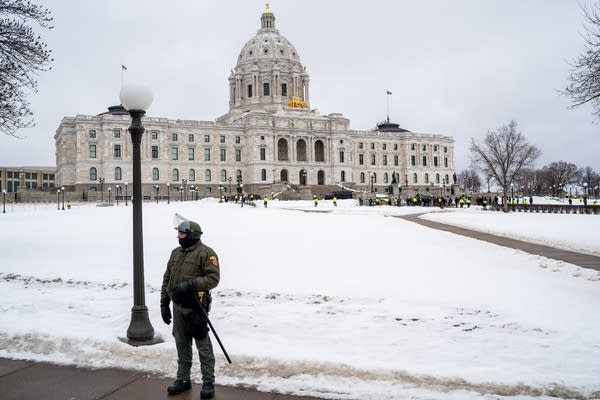Security funding for Chauvin trial hits roadblock at Capitol

Go Deeper.
Create an account or log in to save stories.
Like this?
Thanks for liking this story! We have added it to a list of your favorite stories.
Gov. Tim Walz’s plan to create a $35 million fund to pay for security around the upcoming trial of the first former Minneapolis police officer charged in the death of George Floyd ran into a roadblock in the Minnesota House on Monday.
Democrats couldn’t round up enough votes to pass the measure, even though the House sponsor, Rep. Carlos Mariani, DFL-St. Paul, said he was ready to make major concessions to get it — or at least something — passed.
“It seeks to respond to a potential need for action now as the nation’s and the world’s attention will become focused on Minnesota and on the unique trial that commences in just a few weeks,” Mariani said of the bill. Reflecting on upheaval last year, he added, “The scale of what we saw last spring overwhelms any single local jurisdiction to manage.”
Some House Democrats have concerns about a ramped-up police presence during a court case all about police conduct in Minneapolis amid persistent tensions between officers and minority residents. And there were no indications any Republicans were on board to save the proposal as written; they had amendments lined up for consideration to pare back conditions on police departments that would receive the state funding.
Turn Up Your Support
MPR News helps you turn down the noise and build shared understanding. Turn up your support for this public resource and keep trusted journalism accessible to all.
In the Senate, a unified Republican caucus passed an alternative bill that would make Minneapolis pay the expenses of other police departments that would be called in as backups to prevent another potential outbreak of civil unrest. The Senate bill would reroute state aid money to Minneapolis to ensure that the city covers the cost of extra police help.
Senate Majority Leader Paul Gazelka, R-East Gull Lake, said some cities are wary about sending help without assured reimbursement.
“We recognize the riots could happen, and we want to make sure we have a large enough force we can stop them before they really get started,” Gazelka said.
Republicans argue against having the state step up as Minneapolis City Council members make moves to cut the city’s police budget and overhaul its operations.
Sen. Torey Westrom, R-Elbow Lake, said it would send a bad message of, “defunding the police and then expecting all the neighbors to come in and back them up when they need law enforcement and public safety.”
All Senate Democrats voted against the plan to dock Minneapolis-bound state aid payments.
Sen. Patricia Torres Ray, DFL-Minneapolis, took offense to characterizations that her city is a drain on other communities.
“The Twin Cities are the economic engine for the state of Minnesota,” Torres Ray said. “Our taxes pay for your roads, your police officers, many, many things.”
Fellow DFL Sen. Omar Fateh represents the area where Floyd died in police custody. He assailed the bill as an attempt to score political points.
“So at a time when we are devastated by two crises — COVID-19 as well as the murder of George Floyd, you are kicking people while they are down rather than proposing meaningful action,” Fateh said.
The bill is unlikely to go anywhere in the House.
DFL House Speaker Melissa Hortman said negotiations among legislative leaders about a middle-ground solution have yet to produce any results. She expects sheriffs and police chiefs to offer up help to Minneapolis regardless of whether a financing plan is in place.
With or without a deal, units from the National Guard, State Patrol and DNR will be sent in next month at state expense to assist Hennepin County deputies and Minneapolis police officers.
“So the question is not will the mutual aid be provided, but is simply how the mutual aid be paid for,” Hortman said.
A spokesperson for Walz said other law enforcement preparations for the trial will continue but officials will adjust plans accordingly if no bill is passed into law.


